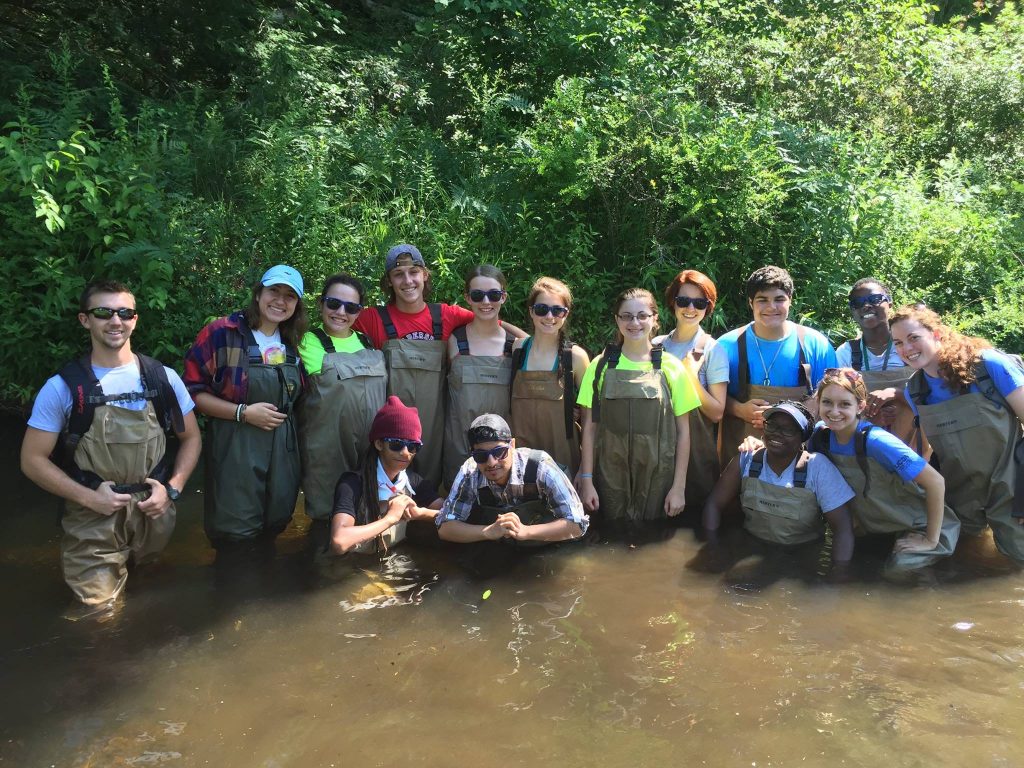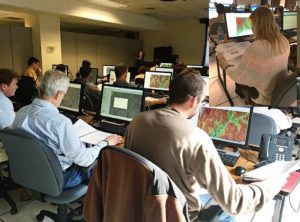Founded in 2011, the Natural Resources Conservation Academy (NRCA) is designed to provide high school students with a structured informal learning experience focused on the environment, natural resources and geospatial technologies. In case you haven’t heard about it yet, let me get you caught up. The NRCA is all about making connections. Connecting young adults to the environment around them, to professionals in the field of natural resource science, to their communities and local conservation programs, to the University and a potential career in a STEM (Science Technology Engineering Math) discipline, and of course, to each other. These connections begin to form for students as they are immersed in a week-long field experience on the UConn campus, and continue to develop as students go on to complete conservation projects in their communities. The success of the NRCA can be measured by the smiling faces of the students (over 100 of them so far!) who return to campus each spring to present the results of their ten-month, conservation based service learning project to scientists and professionals at the Connecticut Conference on Natural Resources. It can also be measured by the dedication of a small group of faculty members within the College’s Department of Natural Resources and the Environment (NRE) and Department of Extension who come back each year to participate as educators and mentors in the program. These folks have worked tirelessly to grow the program from a big idea into a big success. That includes several of us here at CLEAR.

The success of the NRCA can now also be measured in dollars. As in, over $3 million of them
– grant dollars awarded by the National Science Foundation (NSF) and the United States Department of Agriculture (USDA) for two new research projects that will extend the reach of the NRCA’s conservation science and technology programs into even more schools and communities across Connecticut. The NRCA “Education Triad” as it is affectionately called in the hallways at CLEAR, consists of three programs: The Conservation Ambassador Program (CAP) – the original NRCA – for teens; the Conservation Training Partnerships (CTP) for teens and adult learners; and Teacher Professional Learning (TPL) for middle and high school teachers. The two new projects, the CTP and TPL, are interdisciplinary partnerships across the university and in addition to original NRCA collaborations, now include faculty from Neag School of Education’s Department of Curriculum and Instruction (EDCI) and the Center for Environmental Sciences and Engineering (CESE).

The NSF funded NRCA CTP is a five-year project modeled closely on the original NRCA field experience and community partnership project, but is centered on employing the science and practice of geospatial technologies to teach practical approaches to conservation. It is also expanded to explore the concept and patterns of intergenerational learning. What we’ve learned from informal observations of the interactions between adolescents and adults collaborating on community projects over the past five seasons of the NRCA is that each age group brings something unique to the partnership. Adolescents are often familiar with, and interested in computer technology, picking up on mapping skills quickly, and adults strengthen the partnership with their strong connection to nature and their commitment and engagement in community service and conservation. Bringing the two groups of learners together has the potential to produce effective, efficient conservation outcomes, not to mention well rounded individuals.
The USDA funded NRCA TPL is a three-year project that will provide professional development to middle and high school teachers that focuses on sustainable water resources and is tied to the new Next Generation Science Standards (NGSS) recently adopted by the State of Connecticut. These workshops will also incorporate the practice of geospatial science as an effective teaching tool for engaging students in these disciplines and will include productive time for teachers to develop tailored curriculum for their classrooms.
The two new NRCA programs, CTP and TPL, will be offered for the first time this summer, along with CAP. What that means is that, well…we’re pretty busy. You can bet that we are hard at work developing and revising curriculum, as well as reaching out to teens, teachers and adults to participate in all three of these awesome efforts. For more information about these programs, and to apply online (deadlines are coming!), visit the NRCA website today.
Save